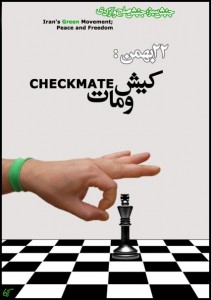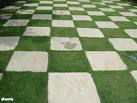Thursday
Jan282010
Iran Analysis: Leadership in the Green Movement
 Thursday, January 28, 2010 at 2:00
Thursday, January 28, 2010 at 2:00  New EA correspondent Elham Gheytanchi writes:
New EA correspondent Elham Gheytanchi writes:The civil unrest that swept Iranian cities in the aftermath of the contested June 12th 2009 election escalates despite the Government crackdown. Violence has been intensifying. On Ashura (27 December), armed plain-clothed forces associated with the Basij paramilitaries beat and killed demonstrators who were also mourning the 7th day of the passing of dissident cleric Ayatollah Montazeri. Hundreds of human rights activists, journalists, opposition clerics, and women’s rights activists were detained on Ashura and the following weeks.
The question is now whether the state can suppress a grass-roots movement, albeit one without a leader, that has blossomed into broad and heterogeneous movement well-known to Iranians and to the world?
Hardliners have until now successfully headed off any attempt at organizing and institutionalizing progressive movements, while the Basij and Revolutionary Guards have freedom to organize, recruit and prosper. In the past, hardline elements in the Iranian state succeeded in suppressing the students’ semi-organized movement as well as the reformists who came to power in the 1997 election that led to the presidency of Mohammad Khatami.
Khatami’s failure to deliver reform first became evident in 1999 when the student uprising in the University of Tehran was violently crushed and the perpetuators went unpunished. In an open letter in 2004, Ayatollah Montazeri wrote to Khatami that he had let the Iranian people down by giving into the pressures exerted by the hardliners in the government. When the Alumni Association of the Office for the Consolidation of Unity (Advar-e Tahkim-e Vahdat) tried to organize students, the Iranian authorities arrested their leaders and indefinitely detained many of their activists. Nonetheless, for many of those hopeful for change, it took the second term of Khatami's presidency to convince them that, given the unwavering support of Supreme Leader Ali Khamenei, the hardliners would not relinquish their hold on power.
The most dynamic part of the women’s rights movement, the One Million Signatures Campaign to Change Laws Discriminating against Women, did not emerge under Khatami’s watch. This grass-roots movement has prospered during Ahmadinejad’s presidency (from 2006 onwards), despite his government proving itself to be harsh in its treatment of women. The Campaign works horizontally, without a leader and as a network of activists, and it has succeeded in becoming a widespread movement active in sixteen provinces in Iran.
Similarly, when Mousavi first started his presidential campaign about a month before the election --- the time allotted for presidential campaigns by the Iranian Constitution --- he asked his supporters to create “setads” or stations that could work independently. “Pouyesh” and “Setad 88” were examples of these independent campaign centers, part of a horizontal network of pro-Mousavi campaigners, comprised mostly of young and enthusiastic students. Later in June, when the demonstrators marched in the streets asking, “Where is my vote?”, Mousavi asked of his supporters that each one of them act as a news medium and spread information about protests, marches, demands and future actions among their family members, colleagues and in their communities. The horizontal structure served the Green Movement well, as the state-backed media refused to cover demonstrations and later denounced protesters as “agents of Western powers” or supporters of the “monafeghin” --- a derogatory term meaning "religious hypocrites", referring to the MKO (Mujahedin-e Khalq) stationed in Iraq.
As the Iranian state intensified its crackdown on protesters, Mousavi issued his 17th declaration on 1 January. This pointed to what has long been the case in Iran: civil rights movements forge ahead without much central planning or leadership. Mousavi stated that the Green Movement, like the One Million Signature Campaign, does not have a leader, and that the Ashura demonstrations took place without his leadership and without appeals from Mehdi Karoubi, other protesting presidential candidate, or Khatami.
As the use of naked violence by plainclothes forces on the streets reaches its peak, and state television and hardline newspapers show protesters’ faces in order to identify and arrest them, there is even more reason for the Green Movement to continue its existence without a leader or leaders. The stakes are high, and Mousavi has maneuvered cleverly by declaring himself not as a leader but as a strong supporter of mass protests. His proposals communicate a strong message to the Supreme Leader and the Revolutionary Guards: “You are directly responsible for the bloodshed.” The protestors showed their preference for non-violent methods on Ashura as they marched adjacent to the famous Pasteur Street where Ayatollah Khamenei lives and where Ahmadinejad’s office is located, without attacking his residence. They have done so without a leader.
The history of community organizing in post-revolutionary Iran shows that grass-roots movements flourish under harsh political conditions, relying on a horizontal structure and without much central leadership. Labor unions, city councils, students’ committees, teachers’ unions and women’s rights activism have been suppressed by the hardline-controlled Ministry of Information. There is a deep conviction in the ministry that any attempt to organize Iranian citizens for reform is led by foreign powers determined to destroy the entire Islamic Republic. Under these circumstances, the Green Movement has behaved much like women’s rights movement, which has avoided centralized leadership and instead has mobilized ordinary people beyond what was previously thought possible.





